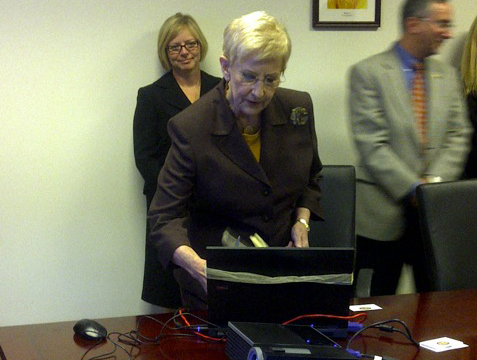
First Lady Sandra Deal preparing to "cut the ribbon" on the new Juvenile Justice Data Clearinghouse website.
With the goal of presenting “the most current and accurate juvenile crime data available,” Georgia's Governor’s Office for Children and Families (GOCF) launched a new website this week. The Georgia Juvenile Justice Data Clearinghouse aggregates data from multiple partners such as the Georgia Bureau of Investigation and the Georgia Department of Juvenile Justice.
“It’s a way to synthesize the information so people can look at it and say, ‘OK, this is what we’ve got,'” said Joe Vignati, director of Justice Programs at GOCF.
“You’ve got pieces of the puzzle all over the place,” Vignati said. And not all counties are able to report their data yet. In fact, one county, Vignati said, is still using paper records.
Georgia's First Lady, Sandra Deal, was the inaugural visitor to the website a few days ago. After signing on, she said, “I am confident that this effort will go a long ways in helping improve outcomes for Georgia’s Youth, “said Mrs. Deal.
The site is broken into three main sections: Reports and Dashboards, Interactive Map and Pre-made Maps, each providing multiple ways of exploring the data from spreadsheets to pie charts.
In Vignati’s opinion, the primary component is the Juvenile Justice Decision Points data. Providing detailed demographic information for 10 key categories, the Decision Points module is searchable by year and county.
“It kind of gives you an idea of what data we have and how complete it is for each of the different decision points along the line,” Vignati said. “These decision points are ones that the Department of Justice uses and expects us to report back to them so the state remains eligible for federal juvenile justice funds.”
Katie Jo Ballard, executive director of the Governor’s Office for Children and Families pointed out how important the new site is in continuing to secure federal funds for juvenile justice programs in the state.
“As a result of this collaborative effort, Georgia is able to draw down millions of dollars in federal funds each year that are used to support juvenile court projects in every county across our state,” Ballard said in a press release.
The Georgia system comes on line at a time when federal officials are beginning to be more agressive in pointing out the short comings of reporting by the states. Criticism is mounting that spotty reporting at the state level is hampering federal efforts to analyse date in a bid to implement best practices.
Last week, the DOJ's Office of Juvenile Justice and Delinquency Prevention issued a report covering a crucial aspect of juvenile justice, the transfer of juveniles to adult court. In it, the OJJDP pointed out the dearth of information from the states on the issue.
In the report, the OJJDP Acting Administrator Jeff Slowikowski mustered a kind of backhanded criticism of the states, writing, “To obtain the critical information that policymakers, planners, and other concerned citizens need to assess the impact of expanded transfer laws, we must extend our knowledge of the prosecution of juveniles in criminal courts.”
Georgia's website is a product of the Juvenile Data Integrity Stakeholders Work Group along with the state's Council of Juvenile Court Judges, Georgia's Department of Juvenile Justice, the Georgia Bureau of Investigation.
